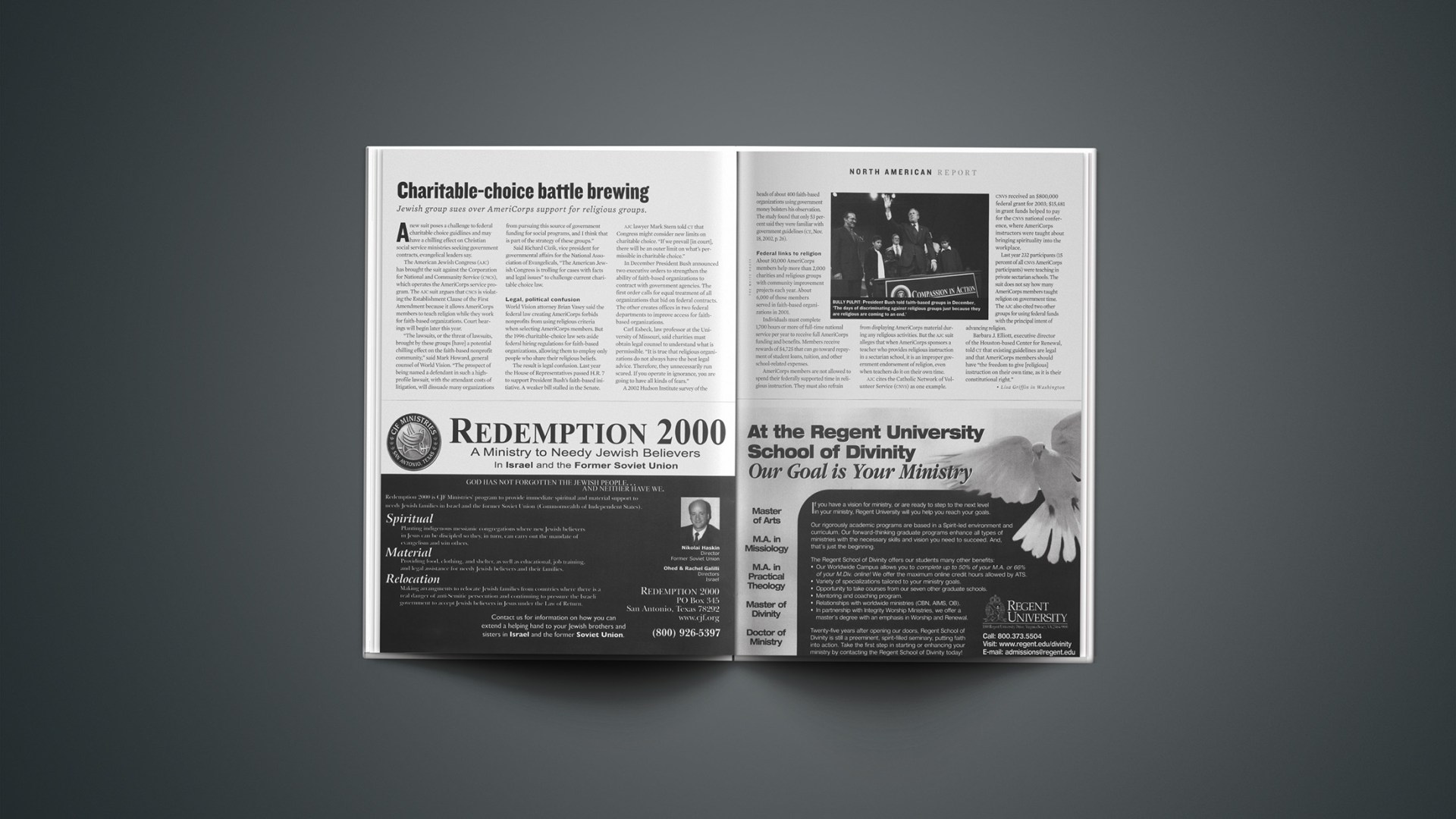A new suit poses a challenge to federal charitable choice guidlines and may have a chilling effect on Christian social service ministries seeking government contracts, evangelical leaders say.
The American Jewish Congress (AJC) has brought the suit against the Corporation for National and Community Service (CNCS), which operates the AmeriCorps service program. The AJC suit argues that CNCS is violating the Establishment Clause of the First Amendment because it allows AmeriCorps members to teach religion while they work for faith-based organizations. Court hearings will begin later this year.
“The lawsuits, or the threat of lawsuits, brought by these groups [have] a potential chilling effect on the faith-based nonprofit community,” said Mark Howard, general counsel of World Vision. “The prospect of being named a defendant in such a high-profile lawsuit, with the attendant costs of litigation, will dissuade many organizations from pursuing this source of government funding for social programs, and I think that is part of the strategy of these groups.”
Said Richard Cizik, vice president for governmental affairs for the National Association of Evangelicals, “The American Jewish Congress is trolling for cases with facts and legal issues” to challenge current charitable choice law.
Legal, political confusion
World Vision attorney Brian Vasey said the federal law creating AmeriCorps forbids nonprofits from using religious criteria when selecting AmeriCorps members. But the 1996 charitable-choice law sets aside federal hiring regulations for faith-based organizations, allowing them to employ only people who share their religious beliefs.
The result is legal confusion. Last year the House of Representatives passed H.R. 7 to support President Bush’s faith-based initiative. A weaker bill stalled in the Senate.
AJC lawyer Mark Stern told CT that Congress might consider new limits on charitable choice. “If we prevail [in court], there will be an outer limit on what’s permissible in charitable choice.”
In December President Bush announced two executive orders to strengthen the ability of faith-based organizations to
contract with government agencies. The first order calls for equal treatment of all organizations that bid on federal contracts.
The other creates offices in two federal departments to improve access for faith-based organizations.
Carl Esbeck, law professor at the University of Missouri, said charities must obtain legal counsel to understand what is permissible. “It is true that religious organizations do not always have the best legal advice. Therefore, they unnecessarily run scared. If you operate in ignorance, you are going to have all kinds of fears.”
A 2002 Hudson Institute survey of the heads of about 400 faith-based organizations using government money bolsters his observation. The study found that only 53 percent said they were familiar with government guidelines (CT, Nov. 18, 2002, p. 26).
Federal links to religion
About 50,000 AmeriCorps members help more than 2,000 charities and religious groups with community improvement projects each year. About 6,000 of those members served in faith-based organizations in 2001.
Individuals must complete 1,700 hours or more of full-time national service per year to receive full AmeriCorps funding and benefits. Members receive rewards of $4,725 that can go toward repayment of student loans, tuition, and other school-related expenses.
AmeriCorps members are not allowed to spend their federally supported time in religious instruction. They must also refrain from displaying AmeriCorps material during any religious activities. But the AJC suit alleges that when AmeriCorps sponsors a teacher who provides religious instruction in a sectarian school, it is an improper government endorsement of religion, even when teachers do it on their own time.
AJC cites the Catholic Network of Volunteer Service (cnvs) as one example. cnvs received an $800,000 federal grant for 2003; $15,481 in grant funds helped to pay for the cnvs national conference, where AmeriCorps instructors were taught about bringing spirituality into the workplace.
Last year 232 participants (15 percent of all cnvs AmeriCorps participants) were teaching in private sectarian schools. The suit does not say how many AmeriCorps members taught religion on government time. The AJC also cited two other groups for using federal funds with the principal intent of advancing religion.
Barbara J. Elliott, executive director of the Houston-based Center for Renewal, told CT that existing guidelines are legal and that AmeriCorps members should have “the freedom to give [religious] instruction on their own time, as it is their constitutional right.”
Copyright © 2003 Christianity Today. Click for reprint information.
Related Elsewhere
Other coverage of the suit includes:
Jewish Group Sues AmeriCorps—Associated Press (Oct. 4, 2002)
The Becket Fund For Religious Liberty this month filed an amicus brief (PDF format) for Americorps. The groups has posted a page on the case online, along with a press release. The AJC complaint is also available on the Becket site.










